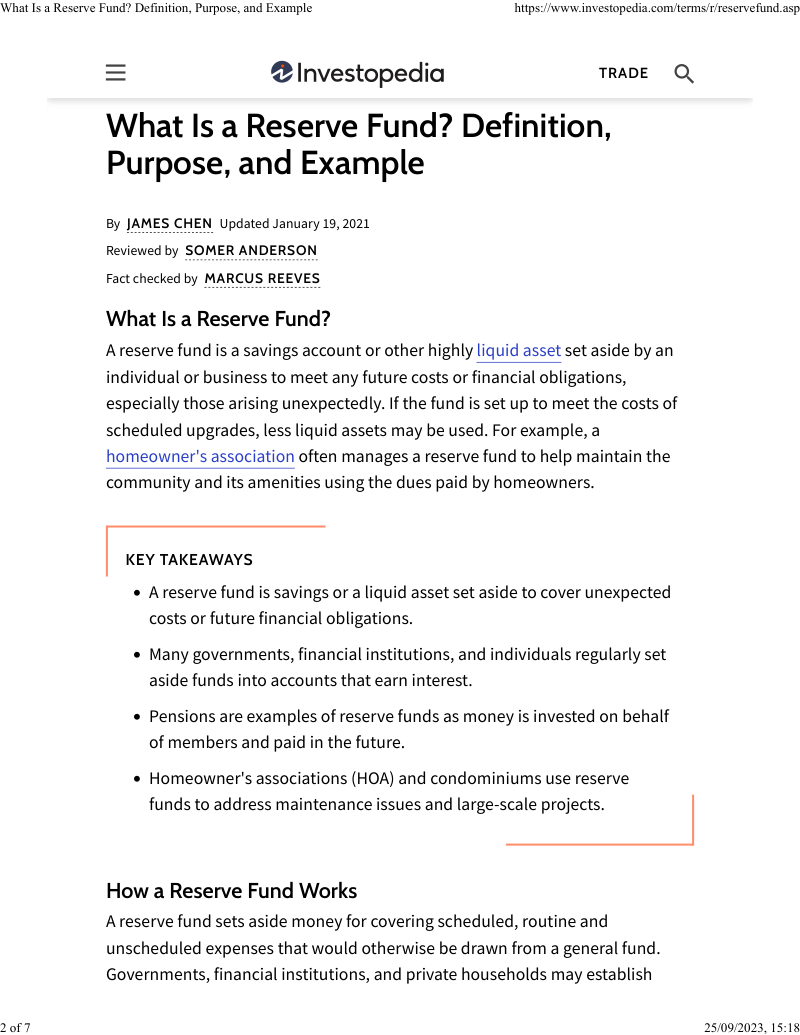James Chen discusses what a "Reverse Fund" is; it is a fund set aside to meet any future costs or financial obligations, especially those arising unexpectedly.
- Type
- Website
- Source
- James Chen Non-LDS
- Hearsay
- Direct
- Reference
James Chen, "What Is a Reverse Fund? Definition, Purpose, and Example," Investopedia, January 19, 2021, accessed September 25, 2023
- Scribe/Publisher
- Investopedia
- People
- James Chen
- Audience
- Internet Public
- Transcription
What Is a Reserve Fund?
A reserve fund is a savings account or other highly liquid asset set aside by an individual or business to meet any future costs or financial obligations, especially those arising unexpectedly. If the fund is set up to meet the costs of scheduled upgrades, less liquid assets may be used. For example, a homeowner's association often manages a reserve fund to help maintain the community and its amenities using the dues paid by homeowners.
Key Takeaways
A reserve fund is savings or a liquid asset set aside to cover unexpected costs or future financial obligations.
Many governments, financial institutions, and individuals regularly set aside funds into accounts that earn interest.
Pensions are examples of reserve funds as money is invested on behalf of members and paid in the future.
Homeowner's associations (HOA) and condominiums use reserve funds to address maintenance issues and large-scale projects.
How a Reserve Fund Works
A reserve fund sets aside money for covering scheduled, routine and unscheduled expenses that would otherwise be drawn from a general fund. Governments, financial institutions, and private households may establish reserve funds.
Although the fund size may vary, the typical goal is to deposit funds regularly in an account that accrues interest, thereby increasing the fund's value while not in use. Because expenses may arise unexpectedly, a reserve fund is typically kept in a highly liquid account, such as a savings account.
In pension funds, for example, money is invested on behalf of a fund's members and later paid out during retirement. When working employees sign up for a pension fund, they put money into a reserve fund that is used to ensure money is available for other employees who signed up to receive a payout when they retire.
Reserve Funds for Condominiums or HOAs
Homeowners' associations and condominiums often use reserve funds in the event of large-scale maintenance or renovation projects, as well as for any costly community emergencies. Reserve funds are typically managed in tandem with operating funds, which more commonly fund the community's day-to-day expenses or recurring costs, such as housekeeping, taxes, insurance, and utilities.
Condo communities and HOAs typically establish and maintain the funds using the dues, or HOA fees, paid by owners to cover maintenance, repairs, and other expenses incurred by the community. The community association's board usually oversees the funds and decides how to allocate its use. For example, rather than tapping into the operating fund, the board may use part of the reserve fund money to cover biannual insurance payments.
If a condominium incurs a large expense that the reserve fund cannot cover, each member or owner may pay an assessment to cover the cost. For example, when a condominium's parking garage needs emergency repairs, unit owners may be asked for additional funds beyond their regular association dues.
Reserve Studies and Managing Reserve Funds
The best way to avoid a special assessment is to ensure the building’s reserve fund is well-equipped with enough money to handle expenses, including those that are unexpected. Often, HOA boards determine how much money should go into their reserve fund supply via a reserve study, where independent consultants assess the state of a property and make recommendations for the reserve fund based on physical and financial analysis.
The experts consider the age of the property, its current state, and the amenities it provides, as well as project maintenance costs that may be needed in the future. Because condominiums or HOAs do not always fully fund their reserves, the final figure determined by a reserve study is only a recommendation.
The implications of a poorly managed reserve fund can translate to higher dues or assessments for members of a community association; so, potential buyers should investigate the efficacy of a particular HOA, or condominium community, before purchasing a home under its jurisdiction.
Sponsored
Investors Earned a 325% Annualized Return Here
Investors were able to collect a 15.4% net return after just 36 days through a sculpture offered by the fractional art investment platform Masterworks —a triple-digit return on an annualized basis. And while it’s not common for Masterworks to exit so fast, investors have recently secured 14%, 27%, and even 35% annualized returns from other offerings. Get priority access to their new offerings and skip the waitlist now.
- Source Link
- https://web.archive.org/web/20231211225050/https://www.investopedia.com/terms/r/reservefund.asp
- Citations in Mormonr Qnas
The B. H. Roberts Foundation is not owned by, operated by, or affiliated with the Church of Jesus Christ of Latter-day Saints.

